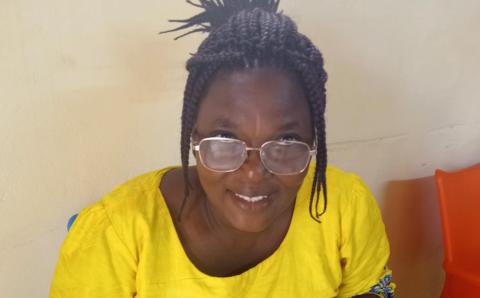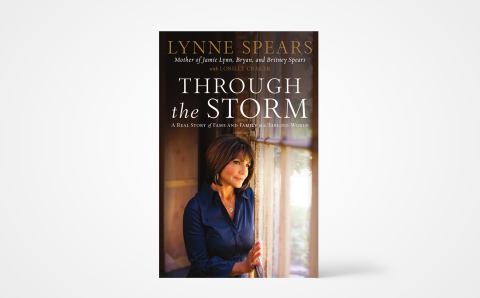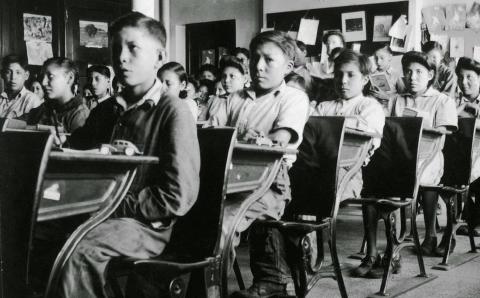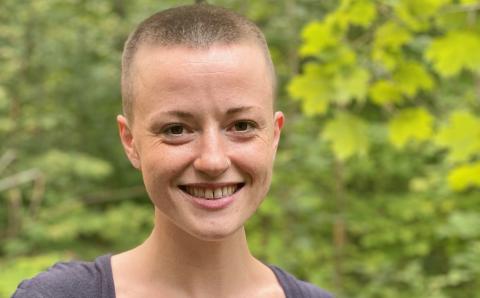“I will listen to what God the LORD says; he promises peace (shalom) to his people, his faithful servants—but let them not turn to folly. Surely his salvation is near those who fear him, that his glory may dwell in our land. Love and faithfulness meet together; righteousness and peace (shalom) kiss each other. Faithfulness springs forth from the earth, and righteousness looks down from heaven. The LORD will indeed give what is good, and our land will yield its harvest.” ―Psalm 85:8-12
In Psalm 85 and elsewhere in the Bible, God promises shalom to his people. But what does shalom look like, and how can it be found in the midst of the pandemic, conflict, injustice, and uncertainty we often find ourselves living in?
In West Africa, a young Christian woman we will call Chioma has nurtured a fierce hunger for shalom. Chioma’s community suffers from the persistent violence of bandits who plunder homes and murder community members, all in a desperate attempt to survive.
While many assume one of the largest threats in West Africa to be Boko Haram, a Muslim terrorist organization, the area where Chioma lives suffers far more from violence flaring up between farmers and herders. Conflict often erupts over the scarce resources of land and water. This has been exacerbated by extreme changes in climate and from population growth that has resulted in people settling on former grazing land.
The violent outbursts between the warring parties reflect a difference not only in vocation but also religion. Herders near Chioma’s home are typically Muslim; most farmers identify as Christian. Both parties have experienced violence at the hands of each other and suffer from pronounced food insecurity.
In fact, economics and hunger are intertwined with the causes of this violence. António Guterres, secretary general of the United Nations, explains:
Conflict and hunger are mutually reinforcing. ... They cannot be resolved separately. Hunger and poverty combine with inequality, climate shocks, and tensions over land and resources to spark and drive conflict. Likewise, conflict forces people to leave their homes, land, and jobs. It disrupts agriculture and trade, reduces access to vital resources like water and electricity, and so drives hunger and famine.
For years Chioma witnessed this vicious cycle first hand, believing herself powerless to stop it. While her own family and home remained safe, Chioma saw deep suffering in her community, and her heart felt burdened for the young women who were losing their homes and loved ones and being forced to move to a local camp for displaced people.
All along Chioma knew: this is not the shalom God intended for the world.
When World Renew launched a training initiative in 2018 so members of Chioma’s community could learn how to listen to and care for those who have experienced pronounced trauma and how to start building new pathways toward peace, Chioma found herself standing up to participate.
“This is a God-given opportunity for me, and I am very thankful I did not miss it,” she said. “Pray for me to use the skills I have acquired to impact young girls like me who are suffering for no fault of theirs.”
The work has not been glamorous, and the setbacks are numerous. Still, Chioma continues to use the skills she has in healing trauma to bring hope, healing, and the promise of peace to her community. This gradual, everyday work is the calling God has placed on Chioma’s life.
From the comfort of our homes and church pews in Canada and the United States, perhaps we too have felt a bit powerless to change the story of violence, hunger, and climate crisis around the world. We ache for shalom.
Chioma’s story encourages us with the reminder that joining in kingdom work often begins with a small, intentional act. While large, one-time events like a protest, Sunday sermon, or conference might stoke our passions and shake us awake to injustice, these experiences mean nothing if not sustained by daily actions that promote peace and justice in our own communities.
And the truth is that the challenges West Africa is facing with the climate and the economic fallout of COVID-19 are circling the globe. In North America, we no longer have to look very far to see signs of disrupted food production, growing food insecurity, and a lack of shalom.
People at John Calvin Christian Reformed Church in Truro, N.S., have learned to identify those who might be facing a food crisis and to lend a hand. As a town founded on a modern floodplain, Truro can be a difficult place to grow food, making fresh produce in the area quite expensive. The health disparities this creates between high- and low-income families inspired members of the church’s Justice League to reassess their role in loving their neighbors and has also led many members of the congregation to join the Climate Witness Project (a joint campaign of the CRC’s Office of Social Justice and World Renew) as advocates for creation care in their community.
As a result, John Calvin CRC has spent the past seven years developing a community garden on a half acre of their land that is safely removed from the floodplain. With this garden, local families—members or not—can tend their own plots and supplement their diets with fresh vegetables they grow themselves. Most of these families are Truro residents from low-income neighborhoods.
With the onset of the pandemic in 2020, the church watched as the community garden took on added significance for Truro: helping families maintain a measure of food security even in this time of increased economic hardship. At the same time, John Calvin CRC found its gaze widening to those struggling beyond Truro. The congregation began to pray about ways to bring peace and flourishing to more families.
The community of East Preston is about an hour away from Truro. Historically an African Nova Scotian community, it was once a farming community that supplied fresh produce and meat to residents of urban Halifax. However, farming has declined in East Preston, and today there are no grocery stores in the community, making it a modern food desert.
When an elder and a deacon from John Calvin CRC met with three members of the East Preston Ratepayers Association via Zoom in May 2020 to discuss the situation, they learned that pandemic restrictions had created a sense of urgency to increase food production. When the conversation turned to solutions, no one was looking for a quick fix. They were seeking a sustainable approach that could build a foundation for food security far into the future.
The East Preston Ratepayers have a vision of a community that produces food and shares it with each other, restoring the strong bonds of care they used to have. The main barrier to getting started was funding for supplies, such as lumber and soil to create raised garden beds.
With grant money from Diaconal Ministries Canada and World Renew, plus additional funds raised by a church offering and a vegetable transplant sale, John Calvin CRC committed to support the East Preston Ratepayers in achieving their vision. Community gardeners also donated dozens of seedlings to the East Preston garden to help them get started.
Church members and neighbors shared their experience of starting a community garden, including the adaptations they made due to COVID-19 restrictions, so that residents of East Preston would be better equipped for success.
One year later, the East Preston garden was up and running, with community members enjoying the fruits of their labor. With just a little support from the congregation at John Calvin CRC, East Preston residents had everything they needed to spread flourishing throughout their community and start changing its food landscape for good.
For Chioma, shalom started with tending to stories of trauma in her community. For John Calvin CRC, shalom began with the choice to change stories of hunger. For both, shalom required them to bear witness to stories of hardship happening right before their eyes.
When the issues affecting hunger and poverty become political, they can sometimes shift us away from the people right in front of us who are hurting. As we seek to faithfully follow our Lord Jesus Christ, we have an opportunity to focus less on the politics of our day and more on the wounded before us. How might God be inviting us to follow in the footsteps of Chioma and John Calvin CRC to cultivate shalom right where we are?
About the Authors
Katy Johnson, World Renew
Victoria Veenstra
Rebecca Sooksam









